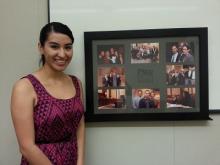“Factors leading to conviction of the innocent are such things as mistaken eyewitness identification, police misconduct, coerced confessions and unreliable forensic laboratory work,” said senior Jessica Gonzalez as she flipped through pages and pages of a PowerPoint presentation she put together. All of the information on her slides was what she learned during her internship at the Innocence Project Northwest Clinic, housed in the Law School of the University of Washington.
When the Law, Societies and Justice major and Human Rights minor started at the IPNW Clinic back in April, she was among the first undergraduate interns who had the opportunity to work there. At the clinic, students, according to the organization’s website, “receive hands-on experience interviewing and counseling clients, developing facts, drafting motions and briefs, negotiating and presenting appellate arguments” in order to aid in the exoneration of wrongfully convicted inmates.
The IPNW Clinic has been around since 1997, founded by Prof. Jackie McMurtrie. It is part of the Innocence Network, an affiliation of organizations described on its website as “dedicated to providing pro bono legal and investigative services to individuals seeking to prove innocence of crimes for which they have been convicted and working to redress the causes of wrongful convictions.”
“We try and obtain undiscovered evidence that wasn’t mentioned in their trial. If we find [it], we try and open up a new review,” Gonzalez said.
Although some cases involve DNA evidence, Gonzalez has been working on non-DNA cases. Though she couldn’t specifically refer to any of the cases she is working on in order to maintain client confidentiality, she was able to share her experiences at the clinic.
At IPNW, she organizes case materials like police reports, court transcripts and medical records, on top of creating case chronologies in order to better organize the facts of the case. In team meetings, the group working at the clinic discusses the cases that come in, which range from 30 to 50 per month according to the IPNW’s website, and decide whether they have enough resources for the case and if it fits their criteria of representation.
During her research when applying for the program, “I became fascinated [by what they do],” Gonzalez said. “I do believe our criminal justice system needs to be reformed. As a result of discovering what the Innocence Project does, I felt that was a good way of learning more about the kind of cases that are going through the criminal system, and how many individuals are innocent and being incarcerated.”
But the ins and outs of the criminal system are not all that Gonzalez learned; she also developed her ability to not jump to uninformed conclusions when certain cases arose.
“It’s so easy [in a] case that involves, say, rape or abuse, for individuals to say, ‘Oh, if they’re accused of that crime, then they must be guilty,’” she said. “I think the most important thing I’ve learned from IPNW is not to do that, is to actually analyze a case and read through it, and to actually give the inmate the ability to tell their story without judging them based on the accusation.”
Though this was just the first time that IPNW took on undergraduate students in the program, Gonzalez expects that it is something they will continue to do. Other LSJ majors may be able to follow suit.
“This is a great opportunity whether you’re interested in criminal laws or any other issue because this gives you the opportunity to go in depth on how the laws of the United States work, and how it impacts not only a specific person, but their entire family. This is something that I think impacts us all in society,” she said.
This article was composed by Kristine Kim.
